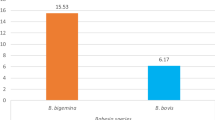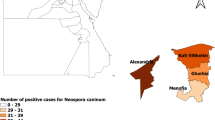Abstract
INFECTIONS with the protozoon Babesia occur frequently in wild and domestic animals, but human beings are apparently very rarely affected. In the British Isles, cattle are the most commonly infected animals and may develop red water disease. The following case is only the third in the world recorded in a human and the first in the British Isles. It is significant that all three patients had previously undergone splenectomy1,2.
This is a preview of subscription content, access via your institution
Access options
Subscribe to this journal
Receive 51 print issues and online access
$199.00 per year
only $3.90 per issue
Buy this article
- Purchase on Springer Link
- Instant access to full article PDF
Prices may be subject to local taxes which are calculated during checkout
Similar content being viewed by others
References
Skrabalo, Z., and Deanovic, Z., Documenta Med. Geog. Trop., 9, 11 (1957).
Braff, E., and Condit, P., Morbidity and Mortality Weekly Report (US Dept. of Health, Education and Welfare, Bureau of Disease Prevention and Environmental Control, National Communicable Disease Center, Atlanta, Georgia, January 7, 1967).
Author information
Authors and Affiliations
Rights and permissions
About this article
Cite this article
FITZPATRICK, J., KENNEDY, C., MCGEOWN, M. et al. Human Case of Piroplasmosis (Babesiosis). Nature 217, 861–862 (1968). https://doi.org/10.1038/217861a0
Received:
Issue Date:
DOI: https://doi.org/10.1038/217861a0
This article is cited by
-
Infection of the Mongolian gerbil with the cattle piroplasm Babesia divergens
Nature (1979)
-
Babesia galagolata n. sp., eine Babesienart des Galagos (Galago crassicaudatus)
Zeitschrift für Parasitenkunde (1973)
Comments
By submitting a comment you agree to abide by our Terms and Community Guidelines. If you find something abusive or that does not comply with our terms or guidelines please flag it as inappropriate.



